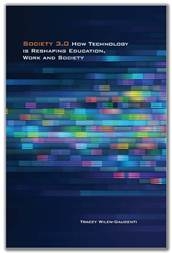Your Work Future? Expect Multiple Careers
 In her book, Society 3.0, Dr. Tracey Wilen-Daugenti of Apollo Research Institute explores how rapid technological advancements are transforming the workplace and the worker. We asked her Five Questions:
In her book, Society 3.0, Dr. Tracey Wilen-Daugenti of Apollo Research Institute explores how rapid technological advancements are transforming the workplace and the worker. We asked her Five Questions:
1) You write that American workers must face a truth: lifelong employment is no longer guaranteed. In practical terms, what does this mean?
People are living longer. According to the Centers for Disease Control and Prevention, life expectancy in the United States has been on the rise for the last decade. Some experts predict people will soon be living to age 100. This means that not only are people living longer—they are also working longer.
According to the Wall Street Journal, many people will work into their 70s and 80s to be able to afford retirement. As part of our ongoing study of women in the workplace, we share this statistic with participants and ask: what does this mean to you?
What we consistently hear is that women realize they must stay educated, healthy and employed to be able to support themselves over a longer lifespan.
With increasing life expectancies, it is not unlikely that a person’s career could span 50-60 years compared to our parents’ 20-30 year careers. On a practical level, people can and probably will have multiple careers, and given economic cycles and market changes, it is unlikely they will stay with one employer unless they are self-employed.
2) Is this a good or bad thing?
The business world has become increasingly complex due to societal shifts and the acceleration of technology and globalization. Companies value people who have innovative ideas and the experience to help them grow.
Firms like to hire people who produced tangible gains in their former positions. Companies also seek educated and diverse individuals with a variety of skills and accomplishments. Employees who accrue a variety of experiences in their career portfolios increase their marketability.
Women especially have been successful in tranferring their skills from the home to the workplace. Fortune’s annual ranking of the 50 most powerful women in business https://money.cnn.com/magazines/fortune/most-powerful-women/2011/full_list/ shows that women occupy leadership roles in a variety of industries with great success. So is this a good thing? Absolutely.
 3) Pfizer, Mattel and Allstate all offer what you call “microwork.” What is microwork?
3) Pfizer, Mattel and Allstate all offer what you call “microwork.” What is microwork?
Microwork is a progression of small tasks that are part of a company’s overall operations. The work is usually simple and internet-based, so large companies often outsource this work for a small fee.
Microworkers are paid by the task or project for work such as transcription, data analysis, video production etc. Odesk.com and guru.com are sites where you can find people to do work or bid on projects. In 2008 Leila Chirayath Janah launched Samasource (https://samasource.org) to provide microwork to developing countries to help the world’s poor.
The implication of microwork is that there is a global marketplace of talent available for minimal cost—which translates into a business asset. But because companies are outsourcing work, employees must continually develop their skills to ensure they have the right level of education to remain relevant and marketable in the workplace.
4) I am woman in my 40s who was hired right out of college and progressed in the same company for 20 years until I lost my job in a downsizing last year. I’m smart and accomplished, and had the economy not failed I would still have my job. How can I make myself more attractive to recruiters?
The resume is a key document for employers. Recent articles suggest that the average recruiter or hiring manager scans a resume for only six seconds looking for key data points such as name, title, firm, start and end dates, education and experience. Firms are looking for people with relevant education, skills and experience who can add value immediately. Often employers are looking for a direct match in terms of the candidate’s experience, skills, and industry. One tip is to craft your resume to include key search terms and links to past employers’ websites.
5) I am a college senior, preparing to enter the workplace this summer. I am smart. I did well in school but I don’t have a ton of experience. Given the economic climate, I am terrified. What three steps would help me find a job in today’s market?
- Develop a resume that outlines skills, education and experience, including key leadership roles, volunteer work, and special projects.
- Work with temporary employment agencies to explore a variety of jobs and firms.
- Use free resources such as the careers center at your college, search job boards, attend job fairs, and visit the local Chamber of Commerce.
Tell us about Apollo Research Institute’s current research on women in the workplace and the future of leadership.
In the past 40 years, women have dramatically increased their participation in education and the workforce–rising from one-third of the workforce to half. Women earn almost 60% of all college degrees. Two-thirds of women are breadwinners or co-breadwinners in their families.
Without women, the U.S. economy would be 25% smaller than it is today. Apollo Research Institute is conducting a comprehensive study to examine the role of women leaders in the 21st-century workforce.
We are interviewing up to 200 women executives in diverse fields and surveying more than 2400 men and women to examine how workers of different genders and generations approach leadership. We are studying their negotiation styles, work-life balance, educational choices and essential work skills. The findings are already showing that women are well poised for leadership in the 21st workplace.

Submit a Comment